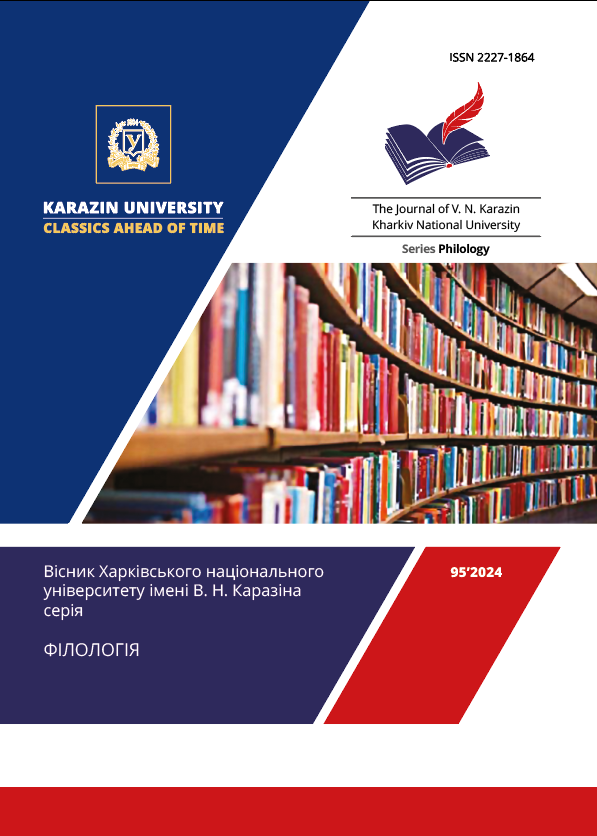The Theme of Gender-Violence in Zinaida Tulub’s Novel “Man-hunters”
Abstract
The article suggest to identify the principal types of descriptions of gender violence and their role in shaping the female characters of the historical novel «Man eaters» by the Ukrainian writer Zinaida Tulub, as well as to trace the influence of social and gender issues on the stylistic structure of the novel.
Attention is drawn to the reflection of the theme of violence and its evolution in the history of Ukrainian literature. Attention is focused on the writer’s critical view of women’s fate in the Polish-Lithuanian Commonwealth, the Ottoman Empire, and the Tsardom of Muscovy of the 17th century.
The following types of gender-based violence are systematized: rape, murder and abduction of children, human trafficking, everyday violence, religious control over women, etc. The author has recorded the main stylistic means used by Zinaida Tulub when depicting gender violence in the novel (landscapes, symbolic images, similes, etc.).
The article offers a comparative analysis of two central female characters in the novel who are victims of these forms of gender violence: the Ukrainian peasant Horpyna Korzh, who finds herself in captivity in a Tatar village, and the Tatar peasant Medzhe, who is kidnapped by Ukrainian Cossacks. The parallel development of these female characters in the novel allows us to draw conclusions about the universality of this violence.
An attempt is made to consider Zinaida Tulub’s works in the context of women’s prose in the 19th and at the beginning of the 20th centuries. Delving into the inner state of female characters experiencing deep emotional catastrophes is one of the characteristics of this prose.
The appeal to the facts of the writer’s biography makes it possible to offer a feminist understanding of the work’s issues from the point of view of modern humanities. The article emphasizes the relevance of the study of gender violence in contemporary literary studies.
Downloads
References
Aheieva, V. (Ed.) (2020). Rebels: New Women and the Modern Nation. Kyiv: Smoloskyp [in Ukrainian].
Aheieva, V. (Ed.) (2023). Bare-headed. Ukrainian women’s prose. Kyiv: Komora [in Ukrainian].
Andrushhenko, V. (2023). War Ethics. In Cultural almanac, (2), (pp. 124–130). Retrieved from https://doi.org/10.31392/cult.alm.2023.2.16 [in Ukrainian].
Bohachevska, M. (1993). Ukraine’s mind is feminine. Kyiv: Voskresinnia. [in Ukrainian].
Charlan, O. (2009). Urban text in historical retrospect (Zinaïda Tulub «Man eaters»). In Actual problems of Slavic philology. Series: Linguistics and Literary Studies: Interuniversity collection of scientific articles. Vol. XX, pp. 106–115. Retrieved from http://dspace.nbuv.gov.ua/handle/123456789/16554 [in Ukrainian].
Cixous, H. (2015). The Laugh of the Medusa. Paris: Honore Champion [in French].
De Beauvoir, S. (2004). The Second Sex. Paris: Honore Champion [in French].
Dziuba, I. (2006). The glorious epic of Zinaida Tulub. In From the well of years. (Vol. 1). (pp. 557–562). Kyiv: Kyievo-Mohylianska akademiia [In Ukrainian].
Rennes, J. (Ed) (2021). Gender Critical Encyclopedia. Paris: La Découverte [in French].
Halenko, O. (2003). About Tatar raids on Ukrainian lands. Ukrainskyi istorychnyi zhurnal, 6, 52–68. Retrieved from http://resource.history.org.ua/publ/journal_2003_6_52 [in Ukrainian].
Humenna, D. (2004). Gift of Evdothea. Memory test. Kyiv: Dnipro [in Ukrainian].
Hundorova, T. (2002). Femina melancholica. Gender and culture in Olga Kobylyanska’s gender utopia. Kyiv: Krytyka [in Ukrainian].
Kovrihina, L. (2016). Genre features of Zinaida Tulub’s novel «Man eaters». In Visnyk Zhytomyrskoho derzhavnoho universytetu imeni Ivana Franka. Filolohichni nauky, 84. Retrieved from http://eprints.zu.edu.ua/22289/1/10.pdf [in Ukrainian].
Kozynskyi, L. (2008). Historical, literary and national-cultural aspects in the structure of the literary text of the novel «Man eaters» by Zinaida Tulub in the background of the period. In Naukovyi visnyk Mizhnarodnoho humanitarnoho universytetu, 1. Retrieved from https://dspace.udpu.edu.ua/bitstream/6789/6523/1 / Kozynsky_Tulub_Odesa_10%2008.pdf [in Ukrainian].
Kulish, P. (1856). Notes of Southern Rous’ in 2 volumes. (Vol. 2). Sankt-Peterburh. Retrieved from URL: http://irbis-nbuv.gov.ua/ulib/item/UKR0001914 [in Ukrainian].
Chronicle of Hadyatsk colonel Hryhoria Hrabyanka (R. Ivanchenko, Trans.) (1992). Kyiv: T-vo «Znannia» Ukrainy [in Ukrainian].
Chronicle of Rous’ (L. Ye. Makhnovets, Trans.) (1989).Кyiv: T-vo «Znannia» Ukrainy [in Ukrainian].
Maierchyk, M. (2013). Gender-based violence: between custom and crime. In Gender for the media: a textbook on gender theory for journalism and other social and humanitarian specialties]. (pp. 151–164). Kyiv: Krytyka. Retrieved from URL: https://ekmair.ukma.edu.ua/handle/123456789/15670 [in Ukrainian].
Maksymovych, M. (1827). Song of Little Rous’. Moscow. Retrieved from URL: https://archive.org/details/malorossiyskiepesni/page/n57/mode/2up [in Ukrainian].
Pavlychko, S. (1997). Discourse of modernism in Ukrainian literature. Kyiv: Lybid. [in Ukrainian].
Pavlychko, S. (2002). Feminism: articles, studies, conversations and interviews. Kyiv: Vyd-vo Solomii Pavlychko «Osnovy» [in Ukrainian].
Petrenko, T. (2022). Ukraina v ohni: ukrainska klasychna proza pro viinu y teror. Chytomo. Retrieved from https://chytomo.com/ukraina-v-ohni-ukrainska-klasychna-proza-pro-vijnu-j-teror/ [in Ukrainian].
Pfefferkorn, R. (2007). Inequalities and social relations. Class relations, gender relations. Paris: La Dispute [in French].
Sahaidak, T. (2008). Artistic interpretation of Cossacks in Ukrainian historical novels of the first half of the 20th century. (Extended abstract of a candidate’s thesis). Kherson National University. Kherson [in Ukrainian].
Syrotiuk, M. (1962). Ukrainian historical novel. Kyiv: Vydavnytstvo Akademii nauk URSR [in Ukrainian].
Toulob, Z. (1986). Man earters. Historical novel. (Vol. 1.) Кyiv: Dnipro [in Ukrainian].
Toulob, Z. (1986). Man earters. Historical novel. (Vol. 2.) Кyiv: Dnipro [in Ukrainian].
Ukrainian folk songs. Social and household songs (1967). Kyiv: Muzychna Ukraina [in Ukrainian].
Short Volhynian Chronicle. In Highly valued word. A bibliography of Ukrainian literature created in various languages during the Renaissance and Baroque eras of the 15th-18th centuries. In four volumes (2006). Vol. 1, pp. 56–77. Kyiv: Akonit [in Ukrainian].
Zhyhun, S. (2023). «Our 20’s»: female version. DOI: 10.5507/ff.23.24462950 [in Ukrainian].
Zborovska, N. (1999). Feminist Reflexions: At the Carnival of Dead Kisses. Lviv: Litopys [in Ukrainian].




